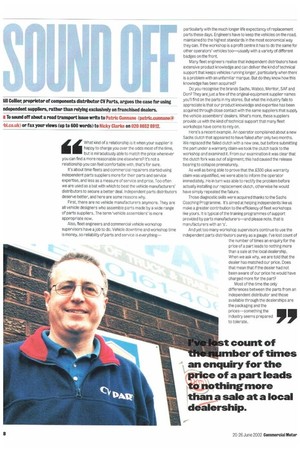S OUND OFF till Collier, proprietor of components distributor CV Parts,
Page 48

If you've noticed an error in this article please click here to report it so we can fix it.
argues the case for using ndependent suppliers, rather than relying exclusively on franchised dealers.
To =Rid off about a road transport issue write to Patric Connell° (patricomnane@ ti.co.uk) or fax your views (up to 800 words) to Nicky Clarke on 020 8652 8912.
dd What kind of a relationship is it when your supplier is
happy to charge you over the odds most of the time, but is miraculously able to match the price whenever you can find a more reasonable one elsewhere? Its not a relationship you can feel comfortable with, that's for sure.
It's about time fleets and commercial repairers started using independent parts suppliers more for their parts and service expertise, and less as a measure of service and price. Too often we are used as a bat with which to beat the vehicle manufacturers' distributors to secure a better deal. Independent parts distributors deserve better, and here are some reasons why.
First, there are no vehicle manufacturers anymore. They are all vehicle designers who assemble parts made by a wide range of parts suppliers. The term 'vehicle assemblers' is more appropriate now.
Also, fleet engineers and commercial vehicle workshop supervisors have a job to do. Vehicle downtime and workshop time is money, so reliability of parts and service is everything—
particularly with the much longer life expectancy of replacement parts these days. Engineers have to keep the vehicles on the road, maintained to the highest standards in the most economical way they can. if the workshop is a profit centre it has to do the same for other operators' vehicles too—usually with a variety of different badges on the front.
Many fleet engineers realise that independent distributors have extensive product knowledge and can deliver the kind of technical support that keeps vehicles running longer, particularly when therc is a problem with an unfamiliar marque. But do they know how this knowledge has been acquired?
Do you recognise the brands Sachs, Wabco, Mentor, SAF and Don? They are just a few of the original-equipment supplier names you'll find on the parts in my stores. But what the industry fails to appreciate is that our product knowledge and expertise has been acquired through close contact with the same suppliers that supply the vehicle assemblers' dealers. What's more, these suppliers provide us with the kind of technical support that many fleet workshops have come to rely on.
Here's a recent example. An operator complained about a new Sachs clutch that appeared to have failed after only two months. We replaced the failed clutch with a new one, but before submitting the part under a warranty claim we took the clutch back to the workshop and examined it. From our examination it was dear that the clutch fork was out of alignment; this had caused the release bearing to collapse prematurely.
As well as being able to prove that the 3013-plus warranty claim was unjustified, we were able to inform the operator immediately. He in turn was able to rectify the problem before actually installing our replacement clutch, otherwise he would have simply repeated the failure.
Those diagnostic skills were acquired thanks to the Sachs Coaching Programme. It's aimed at helping independents like us make a greater contribution to the efficiency of fleet workshops like yours. it is typical of the training programmes of support provided by parts manufacturers—and please note, that is manufacturers with an 's'.
And yet too many workshop supervisors continue to use the independent parts distributors purely as a gauge. I've lost count of the number of times an enquiry for the price of a part leads to nothing more than a sale at the local dealership. When we ask why, we are told that the dealer has matched our price. Does that mean that if the dealer had not been aware of our price he would have charged more for the part?
Most of the time the only differences between the parts from an independent distributor and those available through the dealerships are the packaging and the prices—something the industry seems prepared to tolerate.
























































































































































